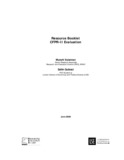Resource Booklet CFPR-II Evaluation
Date
2008-06Publisher
BRAC Research and Evaluation Division and London School of Economics and Political Science (LSE)Metadata
Show full item recordCitation
Sulaiman, M., & Gulesci, S. (2008). Resource Booklet CFPR-II Evaluation. BRAC Research and Evaluation Division and London School of Economics and Political Science (LSE). https://bigd.bracu.ac.bd/wp-content/uploads/2020/03/Resource-Booklet_CFPR-II-Evaluation.pdfAbstract
Challenging the Frontiers of Poverty Reduction (CFPR) is one of the relatively recent additions to BRAC’s long experience with development approaches. This experimental program was launched in 2002 with a complete package of supports targeting the ultra-poor. BRAC’s years of experience in working with the poor has been key to the design and implementation of the program. Moreover, there is a clear time-bound strategy to bring the ultra-poor to mainstream development programs. The objective of this resource book is to present an outline of the research framework and evaluation design of CFPR in the second phase. Since there have been several innovations in the CFPR-II, the study starts with a brief description of the program and the changes. This includes a profile of the target population, the overview of different intervention models in the CFPR-II, and the selection process. The methods used in this study will be different based on feasibility and desirability. Key evaluation strategies included Randomization and propensity score matching. The study found that a major aspect of the impact of the program that was not identified in the previous evaluation is the spillover effects of the program. These spillover effects can play a substantial role in the lives of the community. The evaluation of the CFPR II program will also address the question of what sorts of social and economic institutions play role in the lives of the poor.

